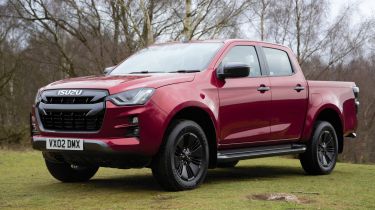For years, the popularity of the double-cab pick-up truck has been fuelled by favourable tax legislation, possibly more so than any other type of vehicle on the UK car market. From July 1 2024, that is set to change as HMRC has announced that double cab pick-up trucks with payloads of over 1,000kg will no longer be classified as commercial vehicles for Benefit-in-Kind (BIK) company car tax purposes and will instead be classified and taxed as cars.
The appeal of the double cab truck has long been that these five-seat vehicles, often with very well-appointed and car-like interiors, have been classified as commercial vehicles and those using them as company cars have paid the flat commercial vehicle rate of BiK tax. The reclassification of pick-up trucks as cars will bring a significant tax increase for double-cab users who will instead pay BiK tax on the company car tax system, which is calculated using the vehicle’s CO2 emissions.
The 1,000kg minimum payload will no longer apply and any pick-up truck with a second row of seats will be deemed liable for company car tax. There will, however, be exceptions for modified vehicles such as those that retain the four-door, double-cab body style but have the rear seats removed and the rear glass panelled over to create an enclosed load area.
Double-cab pick-up 2024 BiK tax changes
The new guidance from HMRC came about following a long-running debate around the tax treatment of vehicles that walk the fine line between van and car. HMRC won an appeal against Coca-Cola in 2020 over the tax classification of five-seat vans. Two Volkswagen Transporter Kombis and a Vauxhall Vivaro crew van run by the company and classed as vans for tax were judged to be being used as cars.
Since then, doubts have circled the tax classification of vans and pick-up trucks with two rows of seating and, following the pandemic, HMRC stepped up its investigations into the issue. The writing was apparently on the wall for double-cabs and in recent years we’ve seen a significant reduction in the number of these models being offered on the UK market.
Double cab pick-ups look set to retain their VAT classification as commercial vehicles enabling VAT-registered companies to make savings, but employees are going to be hit hard in the pocket.
How much more will you pay?
The UK’s most popular pick-up is the Ford Ranger. It costs from just under £30,000 (+VAT) in base double-cab form and CO2 emissions are 179g/km from the 168bhp 2.0-litre EcoBlue diesel engine. If this truck was taxed as a commercial vehicle, company car users in the 20 per cent income tax band would pay a flat rate of £792 per year in BIK tax and 40 per cent tax payers would pay £1,584.
From July 1 2024, the Ranger double-cab will be taxed as a company car with its CO2 emissions putting it in the top 37 per cent company car tax bracket. That means 20 per cent tax payers will be looking at a tax bill of around £2,100 and 40 per cent tax payers step up to a £4,100 outlay.
Need to sell your car?
Sell your car with Motorway. 84% of customers get more money. Get a free, instant valuation now.
The increase in costs associated with running double-cab pick-ups is likely to have a pronounced effect on the market for these vehicles in the UK. Mike Hawes, chief executive of the Society of Motor Manufacturers and Traders (SMMT), voiced the concerns of the industry: “Double cab pick-ups are critical business tools for many companies and sole operators across Britain, particularly in rural areas and in the construction sector.
“HMRC’s decision to tax them as cars rather than commercial vehicles for Benefit-in-Kind (BIK) purposes will raise costs significantly, and make them an untenable choice for many. The move risks stalling the overall market and its decarbonisation, as businesses will be likely to hold on to older vehicles for longer.”
He added: “With the new rules due in July, there is insufficient time for the industry to adapt to such a major policy change, and the sector believes that it would remain fairer and simpler to use a vehicle’s type approval as the basis for all tax purposes.”
Double-cab pick-up tax employees and employers
Driving or supplying a pick-up truck (as long as it’s one that’s classified as an LCV – see above) has tax implications for both employees and employers. The employee benefits are set to be greatly reduced from July 1 2024 when the historically favourable Benefit-in-Kind company car tax rates for drivers come to an end. VAT-registered purchasers of pick-ups can reclaim substantial amounts of VAT, while companies can often write off the full purchase cost against tax.
Company car tax for double-cab pick-up trucks
The biggest benefit for most pick-up drivers – assuming they are an employee and not a company director – has been reduced Benefit-in-Kind rates covering personal use of your company vehicle outside work. But from July 2024, that will change.
Company car BIK taxation rates are charged on a percentage of the vehicle’s purchase price, but that percentage is linked to CO2 emissions and it rises steeply with more polluting engines. So if you drive a car emitting 230g/km of C02 – like the latest top-spec Ford Ranger Wildtrak pick-up – you will face a whacking annual BIK tax liability based on 37 per cent of its purchase price.
It’s a vehicle with a £47,000 P11D value so income tax payers in the 20 per cent band will pay just under £3,500 per year in BIK tax to run it as a company car, and 40 per cent tax payers will be looking at nearly £7,000.
Before July 2024, double-cab pick-ups have been taxed as commercial vehicles with a fixed BIK rate, set at just £3,960 for the 2023/24 tax year. That means a 20 per cent taxpayer would hand over £792 to HMRC for the privilege of using their company pick-up as personal transport, while a 40 per cent taxpayer will have to cough-up £1,584.
HMRC will allow vehicles already purchased or ordered before July 1 2024 to be taxed under the old commercial vehicle classification but any new purchases after that date will be taxed as company cars. Those already using the vehicles will have until the vehicle is sold or 5 April 2028 to continue paying BIK tax under the pre-July 2024 commercial vehicle rates.
VAT and Capital Allowance benefits on double-cab pick-ups
While the company car tax classification of pick-up trucks is set to change from July 2024, they will remain classified as commercial vehicles for VAT purposes. All light commercial vehicles (LCVs) – including double-cab pick-ups with payloads over 1,000kg – qualify for VAT reclaims, as long as the business that purchases the vehicles is VAT registered, of course. The amount of VAT that’s reclaimable depends on how much of the vehicle’s mileage is driven for business. If it’s 80 per cent business mileage, then 80 per cent of the VAT can be reclaimed from the taxman.
This is very different to the position with company cars, as they are only eligible for VAT reclaims if they’re used 100 per cent for business. (Unless they’re bought for use as a taxi, driving school, private hire, or other limited exceptions.) Driving to work from home is not considered as business use by HMRC – a driver who commutes would lose a business all the VAT on a company car, but would lose only a percentage of the VAT on a pick-up.
Pick-ups that are purchased by a business are also eligible for writing-off against Capital Allowances much sooner than company cars. LCVs qualify as ‘plant and machinery’, so the purchase cost can usually be written off in the first year, whereas the write-off rate for company cars could be as low as 8 per cent per year.
Check the details with your accountant
As with all aspects of taxation, it is the responsibility of individuals and businesses to understand the rules and regulations and act accordingly. As personal and business circumstances can vary so widely, it’s vital that anyone considering swapping their company car for a pick-up should take professional accounting advice. The overview we’ve provided is for general guidance only.
The story of the UK pick-up truck market
The latest batch of double-cab pick-ups are larger and tougher than they have ever been before, making them ideal workhorses for tradesmen and those professionals who genuinely need off-road capability. Double-cabs aren’t simply more capable and practical than their predecessors, but manufacturers have increasingly loaded high-spec versions of their commercial pick-up trucks with glamorous styling accessories and the type of luxury options you’d expect to find in an executive car.
Not helped by the looming change to the commercial vehicle company car tax classification, the UK pick-up sector has shrunk markedly in recent years, Popular names like the Mitsubishi L200 and Nissan Navara have departed along with newcomers like the Mercedes X-Class and Fiat Fullback. We still have the likes of the Ford Ranger, Isuzu D-Max, Toyota Hilux and VW Amarok, plus the KGM Musso and the electric Maxus T90 EV, the latter of which could be a good option for those who need a double cab as a company car but want to reduce their tax liability.
With the tax advantages of running a cool-looking double-cab pick-up instead of a traditional family car or SUV set to disappear, the future of the market looks uncertain. Even the best driving 4×4 pick-up will feel unwieldy and unrefined to many drivers thinking of switching from a regular road car, so the appeal of the double-cab pick-up now returns very much in its toughness and off-road ability.
Now, for a full rundown of the tax rules regarding vans, click here…


